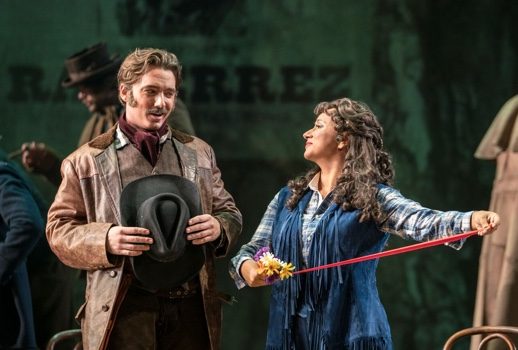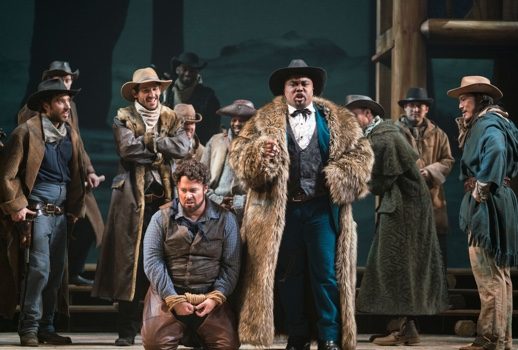

Sonora (Alexander Birch Elliott) flirts with Minnie (Kristin Sampson). Photo: Sarah Shatz.
New York City Opera’s 2017-18 season opened Wednesday night at the Rose Theater with a modest, earnest production of La Fanciulla del West which despite lacking some needed vocal glamour nevertheless proved mighty touchin’—to echo its bracingly colloquial if occasionally perversely obscure surtitles.
Every time I attend a performance of Fanciulla (which unfortunately isn’t very often) my mind races with questions. Is this not Puccini’s greatest opera, his most human, least manipulative? Might Minnie be the quintessential Puccini heroine—complex, heroic, vulnerable? Why is this wondrous, affecting work done so rarely?
Commissioned by the Metropolitan Opera and premiered there in 1910 with the starry cast of Emmy Destinn, Enrico Caruso and Pasquale Amato conducted by Arturo Toscanini, Puccini’s work adapted from David Belasco’s play tells the story of a woman fending for herself in a world of men seeking their fortune in the rough and tumble world of the 1840s Gold Rush. Its American setting prompted librettist Guelfo Civinni to charmingly scatter “Hello!” and “Whisky” throughout the work before concluding it with “Addio mia California!”
Although the opera has the expected helpings of Puccinian “sex and violence,” its most salient and moving quality centers around the redemptive power of love through service to the community. While Minnie and Dick Johnson go off to their hopeful happy ending, it can feel like a tragedy for the men who gather at the Polka Saloon. They have lost the warm, caring center of their isolated existence and perhaps face a more uncertain future than the reunited lovers.
Does any other opera present such a motley crew of unhappy, self-doubting characters? Minnie doesn’t think she’s good enough for Johnson; he thinks nothing of death because life is so miserable; Rance obsesses over a woman who clearly can’t stand him; Jim Larkens, one of the miners, is so homesick he has an embarrassing public breakdown in the middle of the saloon, etc.
They could all use group therapy sessions after those Bible lessons followed by a bunch of self-affirmations in front of a no-doubt grimy mirror. While one harbors suspicions that Minnie’s absolute belief that Johnson is no longer Ramerrez the outlaw is unfounded, their confidence in a better life reassures us… at least for the moment.
General Director Michael Capasso’s pre-curtain welcome speech stressed the cooperative and economical nature of this US-Italian venture which featured wide-ranging if variously effective projections behind only the barest of set elements: a staircase, bar and a few tables for the first act; a fireplace, a necessary if awkwardly situated loft and another table for that all-important poker game in act 2; and then finally a stark railway stand itching to host a hanging.
If the melodrama fell somewhat short of its ideal impact, Ivan Stefanutti, who also designed the sets, projections and costumes, did direct the piece with simplicity and clarity.
The fight scenes lacked the verisimilitude of a John Ford-directed western, but the essential and winning camaraderie of the men came across well. Those magical opening minutes where they fuss and drink and gamble only to be reminded by Jake Wallace’s poignant song of how much they have left behind felt very real and City Opera’s hearty company of chorus and comprimarios gamely sported more scruffy beards and beat-up cowboy boots than the latest bear/bear-blast.

Failure to Lynch: Johnson (Jonathan Burton) defies Sheriff Rance (Kevin Short). Photo: Sarah Shatz.
Standouts were Alexander Birch Elliott’s ringing and virile Sonora and Michael Boley’s sweetly solicitous Nick. One wanted a more mellifluous rendition of Jake’s song than Kenneth Overton provided while Christopher Job sounded challenged by the lowest lines of Ashby’s music.
Conversely Kevin Short’s stolid Rance was stressed at the top of his range sounding more bass than baritone. His peacock of a sheriff, decked out in a striking teal suit and lavish fur duster, was more convincing as merciless lawman than as yearning lover. He thundered impressively but one sensed little of the vulnerability caused by his love for Minnie.
The director had him exit before the opera’s final moments sparing Rance the humiliation of Minnie’s reunion with Dick. Tenor Jonathan Burton’s outlaw lacked the ideal confluence of ardor and menace. He incongruously appeared to be the sweetest guy in town stressing his evolving affection for Minnie and the unfortunate circumstances that forced him into a life of crime. But Burton tackled the role’s vocal challenges head-on punching out (and holding onto) clarion high notes with apparent ease while wearing the world’s droopiest pair of chaps.
Much of the buzz during the second intermission centered on the shock of hearing complete the usually abridged soaring second-act love duet between Dick and Minnie. In it Burton and soprano Kristin Sampson delivered the kind of passionate, full-throated singing longed for by Puccini fans. Sampson, who was Tosca in the revivified City Opera’s opening production in early 2016 ,initially had me worried. Minnie’s magnificent sure-fire entrance in the first act fell flat, and her voice sounded muffled and hoarse while her acting consisted of lots of “hands on her hips” posing. I groaned to myself thinking “this is going to be a long night.”
But gradually it all came together. The diminutive soprano at first lacked the natural authority needed to command her unruly pack of men and she spent a lot of time at the bar with her back to the audience. But the voice eventually warmed up and she began showing us why everyone was so in awe of Minnie’s generosity of spirit.
Her sincere Bible-reading completely captivated her rapt subjects and the banter with Rance climaxed with an imposing high C at the climax of “Laggiù del Soledad.” The awkward back-and-forth with Johnson was perhaps more awkward than it should have been (neither Samspon nor Burton struck me as natural stage animals) but one still sighed with Minnie at her final “Ah!”
While Sampson’s voice could never be called beautiful, she used it expressively and her pungent chest voice grew in effect during the awesomely demanding second act. Her tracing Minnie’s extreme mood shifts from swoony infatuation to fierce betrayal to defiant triumph over Rance wasn’t exactly subtle but it packed a punch. One had to forgive her sounding tired and less potent in the third act after it again became clear that running onstage firing a gun is just not her thing.
Conductor James Meena showed a sure and idiomatic touch though his enthusiastic band (no doubt using a reduced orchestration—they numbered fewer than 70) sometimes lacked unity and there were occasional bobbles from the brass and winds.
Fanciulla was my first encounter with the “new” New York City Opera and while I might have wished for a more polished and sumptuous production I was very grateful to be back in Minnie’s good company again. The company’s season continues with intriguing repertoire never or rarely seen locally, including Picker’s Dolores Claiborne, Montemezzi’s L’Amore dei tre re and Wuorinen’s Brokeback Mountain. The organization is also presenting a rare local recital by the unmissable Anna Caterina Antonacci at Zankel Hall on February 20.

























Comments